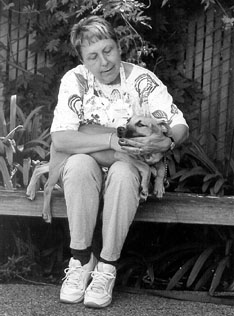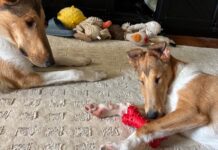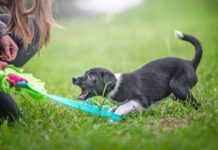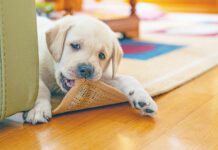You brought this wonderful puppy into your home and very quickly discovered two things: He has needle-sharp teeth. And he bites! Now you have two burning questions: Why does he do it? What should I do?
A puppys gotta chew
Why does your puppy bite?

The simple answer is that puppies bite because they are genetically programmed to do so!
Remember, not too long ago (in evolutionary time) dogs were predators and scavengers who lived in groups. Puppies had to learn to use their teeth, mouth, and jaws as their most valuable tools for survival. They had to learn what is food and what isnt, how to kill prey, and how to chew and otherwise extract nutrition from solid food. Some tasks were more complicated and took a lot of practice to get them right, so Mother Nature endowed the dog with the insatiable desire to use those teeth and jaws.
Puppies also used their teeth and jaws as communication and social tools. They used their mouths to get another living creatures attention just clamp those needle-sharp teeth on the nearest flesh and apply some pressure! They also learned to wrestle with other puppies by using their teeth to grab, hold, and move around their playmates. Some puppies learned that if their littermate had a scrap of food or a bone they wanted, they could apply enough pressure with their teeth so that the other puppy would drop it.
Of course, our dogs today are no longer living in wild packs. But the genetic urge to use and practice their mouth skills is still with them; they cant help but chew and bite everything around them including you!
Given that most dogs eat commercially prepared food that is served to them in a bowl daily, dogs today dont really need to practice their chewing and gnawing skills in order to survive. But they still have to learn methods and rules of proper canine communication both with other dogs, and with their human packmates. Sadly, few puppies have the opportunity to grow up in a social setting where they can learn these important skills from their mother, siblings, and other grownup relatives.
Critical lesson
One of the puppys most important lessons is learned at this trying time: how hard they should and should not bite, usually referred to by dog trainers and behaviorists as bite inhibition. They learn this from their littermates through trial and error. If you have ever watched puppies at play with their siblings, youve seen this lesson in action. The puppies roll around with each other, biting each other wherever they can get a grip. If they bite too hard and with needle-sharp teeth and jaws strong enough to crack bones open, too hard is not very hard at all their brother or sister will do two things: let out a loud shriek of pain and quit the game, leaving the biter alone and puzzled. Game over.
(Incidentally, young children do much the same thing: they grab their playmates, wrestle, and play-fight. It is extremely rare that they really hurt each other. Usually, they learn how to play so that they can get what they want and have fun. If they are too rough, other children cry and stop playing with them. Puppies learn the same thing.)
What pups learn by play-biting people
After a few dozen repetitions, even the slowest puppy learns that good things come to an end when you bite your friends too hard. Its a lesson that will be with them throughout their lives and may even save their lives someday.
You see, bite inhibition is what keeps a dog who does bite someone another dog or a human from biting hard enough to seriously injure the victim. All dogs are capable of ripping another dogs throat open, or slashing your arm to the bone; they have all the equipment needed to do so. But when a dog with proper bite inhibition bites, the result is a hard pinch rather than a bloody tragedy.
A dog with poor bite inhibition, on the other hand, may spend his entire life as the most beloved, trusted, calm, and loving family companion, but if or when he decides to bite, the bite is severe and awful. Many a bewildered family has put their beloved dog to death because they couldnt understand how or why a usually perfect dog could inflict such a terrible bite. These poor dogs never learned how hard they should bite if they do bite; they lacked the subconscious knowledge of exactly what kind of bite pressure will do the job of controlling their immediate social environment.
Just because your puppy didnt grow up in a litter of playmates, however, doesnt mean he cant learn this critical knowledge. By simulating the proper responses, you can teach bite inhibition to your puppy.
Never say never
Unfortunately, this means that at first, youre going to have to let your puppy bite and chew on you! (But not hard Ill get to that in a second.) If you, instead, tell the puppy, NO! every time he tries to bite or chew on you, you will deny him the opportunity to learn how hard social bites should be. This knowledge will be nowhere in his conscious or subconscious. And when the day comes that he is in a social setting (with other dogs or people) where he feels overwhelmed and upset beyond his ability to cope, hell bite because thats what dogs are genetically programmed to do. And that bite will be a bad one.
So, from the very first, you let your puppy bite and gnaw on you but not hard! When your little friend bites to the point that it hurts you, do what another puppy would do: Say Ouch! loudly and quickly, and end your petting or play session. Get up immediately, turn away from the pup, and pay no attention to him for a minute or two. Then, return to your normal interactions with him.
This can be done from the first minute you interact with your puppy until he decides play biting you isnt very rewarding. With patience and consistency (youll have to train all your friends and family to do this, too), your pup will gradually learn not to bite as hard and then not to bite at all.
Please note that I said gradually. It usually takes a few weeks of following the correct procedure before you see a big improvement in this behavior. The reason is simple. Play biting is such an important, natural behavior, that we can not change it immediately unless we use harsh punishment. Dont use punishment to stop puppy biting. It will undoubtedly stop the biting but it also may make your puppy fearful or aggressive (that is, act in self-defense, which we often interpret as aggressive). It can also end all his opportunities to learn good bite inhibition.
A little relief
Hopefully, you now understand why your puppy should be allowed to gently bite and chew on you for a critical period of time when he is young. But you hope there is something you can do right away to get your puppy to bite less, right? Happily, there is. While your first job was to teach your pup to inhibit the force of his bite, your next task is to work on reducing the frequency of his play-biting.
If you know that your puppy wants to interact with you whenever he has a chance, you can give him something else to do with you besides play biting. All puppies benefit from learning a few simple requests. Sit, Stand, and Down can all be taught in a positive manner using lure and reward, clicker, or any other positive, non-punishing method. If you are prepared, you can start training your pup before he starts to play-bite you. Some pups will play-bite every time they get a chance, some pups will do it only during high-activity periods. Pay attention to your puppy and always be prepared to engage him in a fun training session rather than letting him decide that nipping you is the best way to get your attention.
Start out by taking a small handful of your puppys food. Sit in a comfortable chair, rest your forearm on your thigh, say Take it! and give the puppy one piece of food. Close the rest of the food in your hand and say Off in a calm, gentle, sweet manner. Your puppy will probably try to get at the food by mouthing and/or pawing. Just keep that hand closed and wait. After a short period of trying to get the food, the pup will take his mouth off of your hand for a few seconds. When he does this, just say Take it! and give him a different piece of food from your other hand. It becomes very clear to the puppy in a short period of time, that when you say Off, if he does not touch your hand for three to five seconds, you will reward him by saying Take it and giving him a piece of food.
You are in the process of teaching your puppy that off means dont touch. After a few days of this exercise, you can start telling your puppy not to play-bite by saying Off before he gets a chance to put his mouth on you. It is very important that you give him something else to do at this time. Dont just keep saying Off! The puppy wants to play with you. Because you are using positive training methods, the puppy knows training is play and will be happy to have you start a training session. Make sure you do lots of short training sessions whenever your puppy gets to have some of your precious time!
What if this doesnt work?
If these methods dont seem to make any difference to your puppy, then you have to figure out why he is still play-biting too frequently or with too much force. Here are some possible reasons and solutions:
You are saying Ouch! in a manner that excites your puppy and causes him to play- bite even more or saying it in such a normal tone that its indistinguishable from your normal interactions. Experiment until you find the pitch and tone that makes him stop.
You are not spending enough time training your puppy and he just has to get your attention. Have more training sessions. Teach everyone in the family to train the pup.
Your puppy is too overstimulated or over-tired. If you are doing lots of short training sessions, dont feel guilty about doing a time-out. Puppies are like children; when they get overstimulated or over-tired, the best solution is a time-out. Take the puppy out to potty, put him in his secure area where he cant play-bite you or anyone else, let him rest up in peace and quiet for a while, and then he will be prepared for the next fun training session and so will you!
Stay positive!
-By Joel Walton
Joel Walton, a founding member of the Association of Pet Dog Trainers, is a canine behavior consultant in the Washington, DC, area who specializes in aggressive behavior cases. His second book, Labrador Retrievers for Dummies, co-authored with Eve Adamson, contains lots of positive pet training advice.





